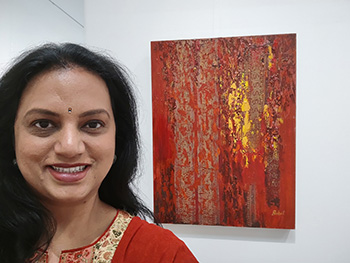
TALLAHASSEE’S VENVI GALLERY TO HOLD ‘REVITALIZATION’ EXHIBIT AUG. 6-25
 Venvi Art Gallery in Tallahassee will present Brinda Pamulapati’s solo exhibition, “Revitalization” from Aug. 6-25. Emerging out of this challenging time, Pamulapati brings new light and inspiration to the gallery for her second solo exhibition. “Due to the coronavirus, I got a chance to slow down, get grounded and refreshed,” she explains, regarding her vibrant, abstract compositions.
Venvi Art Gallery in Tallahassee will present Brinda Pamulapati’s solo exhibition, “Revitalization” from Aug. 6-25. Emerging out of this challenging time, Pamulapati brings new light and inspiration to the gallery for her second solo exhibition. “Due to the coronavirus, I got a chance to slow down, get grounded and refreshed,” she explains, regarding her vibrant, abstract compositions.
She had time to reflect on her work and explore new ideas. Her exhibition will feature new paintings that explore mixed media in her “Saree Series.” Inspired by the culture and artistry of her home country, India, she has incorporated silk sarees that are woven with gold and silver threads, into these paintings. She began with an antique saree given to her by her mother that is nearly 50 years old.
Pamulapati focuses on creating movement in her paintings through the careful manipulation of acrylic paint on canvas. Her paintings are also full of textures and patterns, especially in her newest piece, “Saree Series 4.” In this painting, she has incorporated a deep red saree, embroidered with gold details, that provides a beautiful pattern and texture. But she has taken it a step further and elaborated upon this pattern to create a composition of her own.
Pamulapati draws inspiration from many areas in her life. Her attraction to the use of bright colors, “is the result of my upbringing in a tropical place,” she says, “where clothes, flowers, everything has bright colors.” Additionally, her well-trained eye from years of painting and curating shows has guided her creations. Pamulapati not only has a background in fine arts but also in mathematics. Her wide-reaching background influences her work and allows her to be calculative in her process towards creating her desired final product.
![]() Born in India, Pamulapati has been a part of the Tallahassee community since 1999. Here, she earned her bachelor’s and master’s degrees in Mathematics from Florida State University. After her accomplishments at FSU, she studied under the acclaimed artist Prof. Jacob Pichhadze in Toronto. Along with her previous solo show at Venvi in 2018, her work has also been shown at the FSU Museum of Fine Arts during Asia Culture, Tallahassee City Hall, the Ronald McDonald House, Toronto, and the Yazi Gallery in Toronto. She also writes an art column in Khaas Baat and is the owner/founder of Venvi Gallery since 2015.
Born in India, Pamulapati has been a part of the Tallahassee community since 1999. Here, she earned her bachelor’s and master’s degrees in Mathematics from Florida State University. After her accomplishments at FSU, she studied under the acclaimed artist Prof. Jacob Pichhadze in Toronto. Along with her previous solo show at Venvi in 2018, her work has also been shown at the FSU Museum of Fine Arts during Asia Culture, Tallahassee City Hall, the Ronald McDonald House, Toronto, and the Yazi Gallery in Toronto. She also writes an art column in Khaas Baat and is the owner/founder of Venvi Gallery since 2015.
“Revitalization” will have an opening reception on Aug. 6 from 5 to 8 p.m. Venvi Gallery is at 2901 East Park Ave., Tallahassee. For more information, visit www.venviartgallery.com
The Evolution of the Art Market

For hundreds of years, art fairs and art galleries were the primary places to purchase original art.
Art galleries have had the responsibility of finding artists with great creative ability, promoting their work, and supporting the artists. They have traditionally been highly expensive and prestigious venues, where only art collectors with deep pockets willing to spend a fortune were entertained.

Inspiration, Oil on Linen, present online show at Venvi Art Gallery
by New York artist Austin Palmer Smith.
Art fairs are places where many artists, galleries, art lovers, and art collectors have come together to enjoy and purchase art. To participate in mega fairs, such as Art Basel in Miami Beach and the Armory Show in New York, galleries have had to pay huge amounts to reserve a booth, and art lovers have had to buy tickets to gain access. Comparatively smaller art fairs, such as “LeMoyne’s Chains of Park” in Tallahassee, are more artist friendly and have not required entrance tickets.
As awareness of art has spread, more people beyond wealthy collectors have developed an appreciation for hanging original works of art in their home. As a result of online shopping becoming more accepted and a long confinement indoors, more people have been browsing and purchasing artwork online.
Some businesses have developed innovative ways to sell art remotely. A few examples include gallery partnerships with sites like Artnet and Artsy, which agree to showcase works of art in exchange for monthly membership fees and/or commission on sales. Singulart, an online gallery, represents individual artists and takes commissions.
Prestigious galleries, such as David Zwirner, have also come up with unique online initiatives. David Zwirner selects 100 works of art, chosen from galleries around the world, and introduces them to their private collectors. They take a small percentage of the sale price, but only when the piece is sold.
Virtual galleries have helped new and mature collectors connect to art and artists remotely and further normalized the online purchase of art. This change has enabled galleries to feature artists from distant places without the burden of transporting the delicate artwork for a physical show. Collectors, meanwhile, have gained access to a broader range of collections. From well-curated online galleries, they are now able to build a museum-quality collection with a few clicks of a mouse.

Marker 5, Oil on Canvas, by Nancy Dillen from Melbourne,
now representing in the Tallahassee gallery.
Venvi Art Gallery, too, has expanded to online shows and begun to feature more artists from New York, Berkeley, and other parts of Florida without having to ship the artwork to the physical venue. From the time I opened the doors of Venvi to the age of online viewing and purchasing, I have seen people from all different age groups, social statuses, and geographical locations purchase art. Both mature collectors as well as millennials have browsed and bought art from the physical gallery as well as online. As the artsy website states, “91 percent of the luxury buyers do not buy art.” As art has become more accessible to the general public, art collecting has grown increasingly more democratic.
Brinda Pamulapati, owner/managing director, of Venvi Art Gallery in Tallahassee, can be reached at (850) 322-0965 or visit www.VenviArtGallery.com